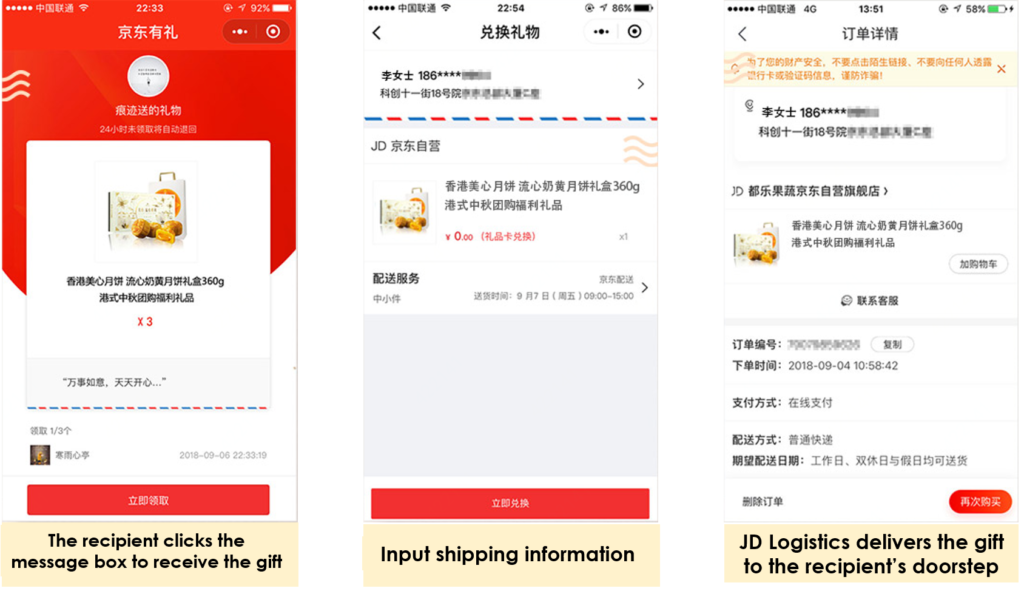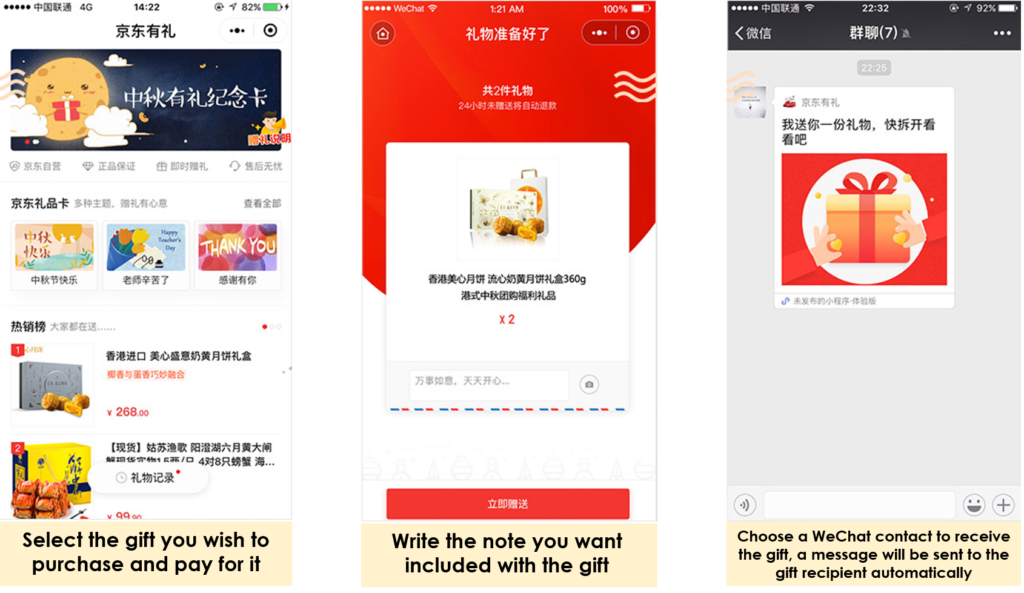Aug 1, 2019|
JD Rescues Chinese Millennials from Rejection when Gifting
Gift giving has been an important part of traditional Chinese culture for thousands of years. The act is believed to shorten the emotional distance between people, facilitate communication and consensus, and even create good business opportunities. The general expectation is that gifts should be given in-person on the spot, but as people are becoming more technologically-savvy, this process has become a bit awkward for some. China’s largest retailer, JD.com, is addressing this head-on with “JD Gift”(京东有礼), a mini-program embedded in Tencent’s WeChat app that makes gift giving easy and approachable.
Ordering a gift online to be sent to a recipient the traditional way is extremely convenient. However there is an often-overlooked, and likely unintended awkwardness attached to it. If you don’t know someone’s address in order to send the gift, you’ll have to ask for it. At that point, it is highly possible that the intended recipient will try to talk you out of sending the gift out of politeness. This is completely avoided with JD Gift.
All the gift-giver needs to do is select a gift from the vast selection available on the gift marketplace, and make the purchase, at which point the recipient will receive a message indicating them to input their shipping information. The gift is already paid for, so there is no need to worry about the recipient politely declining the gift.
 JD Gift is particularly appealing to China’s younger generations. According to Statista, in 2018, there were around 673.5 million social media users in China. Around 30% of mobile internet time is spent on WeChat, and peak WeChat usage is by the 26-35 age group. As the vast majority of Chinese youth now socialize a great deal online, some often find it awkward to give gifts in person and enjoy the comfort of being able to do so virtually rather than face-to-face. According to a JD survey, 34% of users cited avoiding the awkwardness of either giving the gift in person and 28% of users cited the risk of the receiver rejecting the gift as reasons to send e-gift cards instead of physical gifts. Furthermore, they also appreciate the ability to immediately send a gift should a special occasion, such as a friend’s birthday, inadvertently slip their mind.
JD Gift is particularly appealing to China’s younger generations. According to Statista, in 2018, there were around 673.5 million social media users in China. Around 30% of mobile internet time is spent on WeChat, and peak WeChat usage is by the 26-35 age group. As the vast majority of Chinese youth now socialize a great deal online, some often find it awkward to give gifts in person and enjoy the comfort of being able to do so virtually rather than face-to-face. According to a JD survey, 34% of users cited avoiding the awkwardness of either giving the gift in person and 28% of users cited the risk of the receiver rejecting the gift as reasons to send e-gift cards instead of physical gifts. Furthermore, they also appreciate the ability to immediately send a gift should a special occasion, such as a friend’s birthday, inadvertently slip their mind.
 JD has been selling gift cards through its mini-program for several years, but only started quietly testing the option to purchase physical gifts in the last year. This is particularly timely given that Qixi Festival (also known as Double Seventh Festival), which is considered China’s “Valentine’s Day” falls on August 7th. Qixi festival celebrates the Chinese folk tale, “The Cowherd and the Weaver Girl”. As the story goes (and there are many versions of it), a cowherd and a weaver girl fell in love, but because their love was not allowed, they were banished to opposite sides of the heavenly river. Once a year, on the 7th day of the 7th lunar month, a flock of magpies would form a bridge to reunite the lovers for one day. This is what is celebrated during Qixi, and today there is a gift giving expectation for young couples around the celebration each year.
JD has been selling gift cards through its mini-program for several years, but only started quietly testing the option to purchase physical gifts in the last year. This is particularly timely given that Qixi Festival (also known as Double Seventh Festival), which is considered China’s “Valentine’s Day” falls on August 7th. Qixi festival celebrates the Chinese folk tale, “The Cowherd and the Weaver Girl”. As the story goes (and there are many versions of it), a cowherd and a weaver girl fell in love, but because their love was not allowed, they were banished to opposite sides of the heavenly river. Once a year, on the 7th day of the 7th lunar month, a flock of magpies would form a bridge to reunite the lovers for one day. This is what is celebrated during Qixi, and today there is a gift giving expectation for young couples around the celebration each year.
“In today’s fast-paced world, it’s important to take the time to show our loved ones that we’re always thinking about them,” said Xiaohua Luo, Head of JD Gift Card. “We understand that our customers are busy, and want to make it as easy as possible to send gifts to their loved ones. JD Gift shows how technology innovation can help make the long important tradition of gift-giving convenient and hassle-free.”




 JD AI Makes Customer Service Simple
JD AI Makes Customer Service Simple



